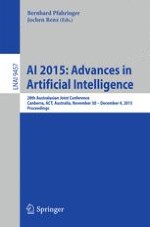2015 | OriginalPaper | Buchkapitel
Probabilistic Belief Contraction: Considerations on Epistemic Entrenchment, Probability Mixtures and KL Divergence
verfasst von : Kinzang Chhogyal, Abhaya Nayak, Abdul Sattar
Erschienen in: AI 2015: Advances in Artificial Intelligence
Aktivieren Sie unsere intelligente Suche, um passende Fachinhalte oder Patente zu finden.
Wählen Sie Textabschnitte aus um mit Künstlicher Intelligenz passenden Patente zu finden. powered by
Markieren Sie Textabschnitte, um KI-gestützt weitere passende Inhalte zu finden. powered by
